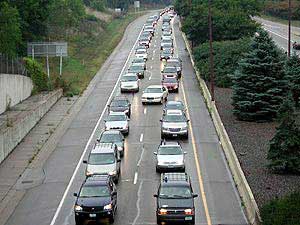|
Audio
Photos
More from MPR
Resources
|
 |
| Minnesota's highway system is wearing out, and Gov. Pawlenty is proposing a referendum to guarantee a certain amount of funding for highway projects each year. (MPR file photo) |
Brooklyn Park, Minn. — Many lawmakers support the amendment. But Democrats say money borrowed for past transportation projects is coming home to roost. They say paying off the bill leaves the state far short of having enough money to build new roads and take care of existing ones.
Voter approval of the constitutional amendment would add several hundred million dollars to the state transportation coffers. But that money would come out of a different part of the state's budget, since it's from taxes already being collected on the sale of vehicles.
Right now a good share of the motor vehicle excise sales tax, called MVST, goes to the state's general fund.
Gov. Pawlenty said at a Brooklyn Park press conference that directing all the MVST money to transportation is central to his $2.5 billion road and bridge spending plan over the next four years.
"The constitutional amendment that will be on the ballot this fall will dedicate 100 percent to transportation funding," said Pawlenty.
Out of that 100 percent, 60 percent would go for roads and bridges, and the other 40 percent would go for other transportation projects, including transit.
But all of that money wouldn't be immediately available. To fund his plan, the governor proposes borrowing against the anticipated collection of those dollars.
Democrats say that strategy perpetuates Minnesota's transportation spending dilemma.
There's wide agreement that Minnesota is falling behind on existing road maintenance, and building new roads. Three years ago lawmakers approved a catchup plan, under which the state sold bonds and borrowed against anticipated federal road dollars to finance the projects.
Minnesota House Transportation committee member Bernie Leider, DFL-Crookston, says the borrowing means some future federal road funds approved by Congress won't be available.
"That's spent. The federal monies coming to MnDOT now are being deducted now by the amount that was being accelerated," said Leider.
The Minnesota Chamber of Commerce supports Gov. Pawlenty's strategy. Chamber President David Olson says improving the state's transportation system is the group's second priority, behind controlling health care costs.
Where the chamber and the governor part company is on increasing the gas tax. Pawlenty opposes raising the gas tax, while the chamber supports it.
Olson says not having any new revenue, such as a higher gas tax, makes it essential that voters approve the ballot question this fall directing motor vehicle sales tax dollars to transportation -- approval, he says, which is by no means a sure bet.
"We clearly need additional monies. Our take though is this is going to be difficult to pass, and we want to put every effort that this happens," said Olson. "Imagine how much further behind we'd be if we lose on this deal."
Democrats say the added MVST dollars will supply some money at first, but then will need to be used to pay off existing debt -- and the new debt racked up by borrowing against those dollars.
"Even if we did have that money, it still doesn't pay for itself," says Sen. Steve Murphy, DFL-Red Wing, who chairs the Senate Transportation Committee. "Because once you get into years six, seven and eight of the program, you're spending more money on interest payments on these bonds that the governor has let out, than we're making on the mvest money."
Lawmakers share responsibility, since they approved the governor's earlier borrowing plan.
Senate DFL Majority Leader Dean Johnson prefers a pay-as-you-go strategy, instead of the state's current pattern of borrowing for roads and bridges.
"I would prefer that we pay our fair share in this generation, and not have our children and grandchildren say, 'Why did our Legislature do that, and now I'm having to pay?'" said Johnson.
Even if voters this fall approve spending all of the motor vehicle excise sales tax dollars on transportation, advocates say we still fall far short of keeping pace with the demands on the state's roads and bridges.
The state's own measurements show money spent just on maintaining the existing system is not enough to keep up with the costly deterioration, that each day adds to future transportation costs.




